The Mike Judge Interview: Part 1: Extract As Semi-Autobiographical, The Film's Epic Bong Scene, The Origination Of His Ball Humor, And Issues With Realism In Modern Movies
Renowned American writer/animator/director Mike Judge and hype often seem like complete strangers. As noted in the press, Judge's friendly, calm demeanor is devoid of Hollywood pretension; his preference for living and working in Austin, Texas posits him by choice away from the center of the pop-cult radar. But when one surveys his vast body of work that, since the early '90s, has had the functionality of an assembly line yet is packed the witty punch and subversive observation of the greatest comedy, it can easily bowl over.
Speaking with him, the inherent voices of his animated characters—notably the polar opposites that are Beavis and Butt-Head and Hank Hill—hint at the mental arsenal that has perfectly illustrated the damaged, stubbornly resilient fault lines of a national landscape. Personal aside: Judge's impact on many young people can be demonstrated by the following; on summer vacations, I'd swim in MTV marathons of Beavis and Butt-Head, then go to the beach with a tie-in towel sprinkled with "Uh-huh-huh"s and "Heh heh heh"s. Upon returning to middle school, I'd face a bully who, by eighth grade, had deliberately morphed into an uncanny, doomed facsimile of Butt-Head. It was a ubiquitous combination of "This rules!" and "This sucks!" set to the sights and sounds of the very music Judge championed and skewered on the show beyond compare.
Judge's contributions to live-action comedy are equally successful, and sometimes financially so. Released to little fanfare in 1999, Office Space eventually became both the perennial example of the DVD cult phenom and synonymous with modern cubicle hell. His high concept follow-up, Idiocracy, experienced a famously aborted theatrical release; in less than three years, Idiocracy is now celebrated and oft-quoted by many peoples as nothing less than faux-low brow prophecy and a sci-fi omelet of chuckling eugenic fatalism.
With his latest, Extract, Judge has written and directed a rare and original comedic defense of the modern-day boss that exudes newer shades of adult drama. As nicely played by Jason Bateman, Judge's boss is overloaded with sexual frustration, a petty lawsuit, lazy employees, and an accidentally massive intake of weed. The smart, unobtrusive film, one of the funnier of 2009, enters a marketplace overrun by superheroes and spectacle to deliver laughs that are charmingly huge yet reserved, absurd yet realistic. Some might feel that its subject matter is too common-man, too anti-escape. But Judge creates works that are built to last and unconcerned with being hip. In addition, he continues to propel the dumbass dick joke towards Art Americana. Mike Judge discussed where his nascent interest in nuts humor originates, his layman's knowledge of bongs, and many other things with /Film.
Hunter Stephenson: I grew up on Beavis and Butt-Head, so your work has definitely had a profound effect on me over the years. [Judge says, "That's good. I hope." laughs.] Along with Nirvana and Death Row Records, I think you helped define many a '90s experience.Mike Judge: Wow. [laughs] Thanks, good company. I've been hearing this lately, because that generation, they're all adults now...Would you say, maybe with the exception of King of the Hill, that Extract is the closest thing you've made to a drama? It seems this feature is earning early comparisons to Albert Brooks and the Coen Brothers...Mike Judge: Oh man. That would be nice. I'm a huge fan of both of those, and I guess, you know, I started out writing this as a comedy, but I think it's a comedy that's fairly realistic. It's not too surreal or anything. I guess some drama happens, and I think you're right, it probably is the closest.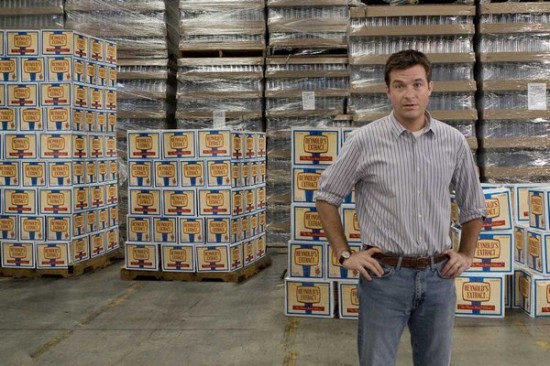 The film's subject matter, it's pretty adult, and the main theme is the difficulty of being your own boss...Mike Judge: Yeah. You know, I've had so many jobs and I didn't get into [the industry] until I was pushing thirty. And so, I had always been the employee and never had anyone working for me. And then, suddenly, with Beavis and Butt-Head, I had thirty to as many as ninety people, at one point, working for me. And you know, seeing it from the other side, I suddenly became really sympathetic to the bosses. But to me, I don't get any pleasure out of telling people what to do. But what I do like is seeing a big project through, and steering the ship and all that. And being the boss just kind of goes with the territory: that you sometimes have to tell people to do what they don't want to do. But, you know, the bosses in Office Space are the types, the mid-management-types, that actually get off on the power of having people underneath them. [quiet laugh] They're not really about the satisfaction of creating something, or manufacturing something. And, yeah, that part of the movie is sort of autobiographical...When I read the script, I felt like maybe this would be your most personal feature; possibly positing your experience making Beavis and Butt-Head, the behind-the-scenes process, into, you know, factory life...Mike Judge: Yeah. In a way. I mean, I also knew a guy, he and his brother started a little company making low-fat salad dressings, you know? [laughs] [laughs] And, ah, I was like, this is pretty cool. I mean, you can complain about jobs all you want, but some people just get motivated to go work for themselves. And a lot of that [is in the film]. But particularly in the factory-part, I kind of directly got that from the Beavis and Butt-Head days. Like, there was a guy, we were doing the album art work for that Beavis and Butt-Head album—the one that had that last Nirvana song on it—and I had done the line art. And back then, the way you would color it was you'd do it on a cell [I say "Right."] and then someone paints it. And that's normally a job that someone gets paid—back then—about ten to fifteen dollars an hour to do. And there was a budget, this was with Geffen.
The film's subject matter, it's pretty adult, and the main theme is the difficulty of being your own boss...Mike Judge: Yeah. You know, I've had so many jobs and I didn't get into [the industry] until I was pushing thirty. And so, I had always been the employee and never had anyone working for me. And then, suddenly, with Beavis and Butt-Head, I had thirty to as many as ninety people, at one point, working for me. And you know, seeing it from the other side, I suddenly became really sympathetic to the bosses. But to me, I don't get any pleasure out of telling people what to do. But what I do like is seeing a big project through, and steering the ship and all that. And being the boss just kind of goes with the territory: that you sometimes have to tell people to do what they don't want to do. But, you know, the bosses in Office Space are the types, the mid-management-types, that actually get off on the power of having people underneath them. [quiet laugh] They're not really about the satisfaction of creating something, or manufacturing something. And, yeah, that part of the movie is sort of autobiographical...When I read the script, I felt like maybe this would be your most personal feature; possibly positing your experience making Beavis and Butt-Head, the behind-the-scenes process, into, you know, factory life...Mike Judge: Yeah. In a way. I mean, I also knew a guy, he and his brother started a little company making low-fat salad dressings, you know? [laughs] [laughs] And, ah, I was like, this is pretty cool. I mean, you can complain about jobs all you want, but some people just get motivated to go work for themselves. And a lot of that [is in the film]. But particularly in the factory-part, I kind of directly got that from the Beavis and Butt-Head days. Like, there was a guy, we were doing the album art work for that Beavis and Butt-Head album—the one that had that last Nirvana song on it—and I had done the line art. And back then, the way you would color it was you'd do it on a cell [I say "Right."] and then someone paints it. And that's normally a job that someone gets paid—back then—about ten to fifteen dollars an hour to do. And there was a budget, this was with Geffen.
So, I thought I'd throw this guy a bone, you know, [laughs] and I got one of the painters to do it, and I said to him, "I'm going to give you $800." Which was pretty outrageously generous of me [with the budget]. So, I did that, and it probably took him fifteen to twenty minutes, maybe, and I hear him in there saying, "Man, this is bullshit, man. They're going to make millions off this thing, and I'm making a lousy $800." [laughs] And you know, I'd done the actual line art. And then I got all pissed. And that really was one of the influences for the guy in Extract [on the work floor].
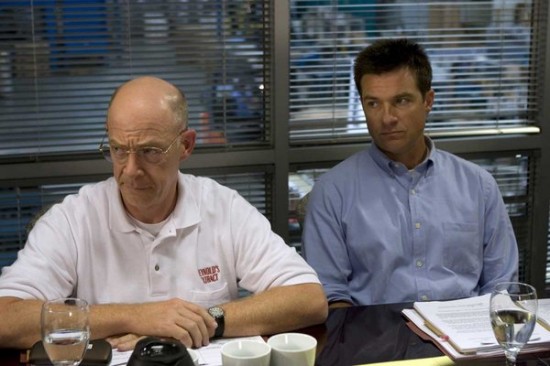 With the bong scene in Extract: you're really aiming for the record books with that. [laughs] I was wondering if that was something you aspired for, to top Cheech and Chong or something. And also, the scene in question uses a Graffix bong. Did you consider going with something more contemporary like a ROOR bong? [laughs]Mike Judge: [laughs] You know, I'm like Jason [Bateman's] character in the movie. I don't smoke pot, I don't like it, it makes me paranoid and I'm allergic. And I guess the amount of smoke in the scene, I can see that. But I wanted to do a [bong scene], because I don't enjoy it. In fact, it's the opposite. I've always had a bad experience. And I wanted to do—maybe it's been done, but I haven't seen it—the aggressive jock stoner? And there's been a lot of stoners in movies, but I haven't seen that guy. There was a friend of my roommate in college, who was a, uh, he looked like he had an extra-Y chromosome and he was on the basketball team. And he would just come over and be like, [aggro voice] "You're going to get fucking high man!" He would say it like a condescending weight-lifting instructor. Or something. [laughs] [laughs]Weed was like an energy drink to him...Mike Judge: Yeah. Exactly. [laughs] But I remember a guy talking about a gravity bong, which I thought just sounded funny and I put that in the script. But then when I saw it, I realized it wouldn't work, because you're lifting this plunger up and all of that stuff. And I didn't know what a Graffix bong was, but Matt Schultze, the guy who plays Willie [the scarily aggro stoner]—the script said 'gravity bong' but I scratched that—and Matt said, "Hey, this is a Graffix bong, you want me to say that?" And I said, "Sure." Because I figure if he's familiar with it and [bragging about it], it's a jock thing and all of that shit. So, I kept that dialogue.That's funny, and I think '90s kids will enjoy it because Graffix was huge when Beavis and Butt-Head was around. There was some crossover maybe. And it has a nostalgic quality now. I've never seen Graffix mentioned in a mainstream movie, so...Mike Judge: I had no idea. [laughs] That's pretty cool. Yeah, I'm out of the loop. I wish that stuff worked for me, but it doesn't.
With the bong scene in Extract: you're really aiming for the record books with that. [laughs] I was wondering if that was something you aspired for, to top Cheech and Chong or something. And also, the scene in question uses a Graffix bong. Did you consider going with something more contemporary like a ROOR bong? [laughs]Mike Judge: [laughs] You know, I'm like Jason [Bateman's] character in the movie. I don't smoke pot, I don't like it, it makes me paranoid and I'm allergic. And I guess the amount of smoke in the scene, I can see that. But I wanted to do a [bong scene], because I don't enjoy it. In fact, it's the opposite. I've always had a bad experience. And I wanted to do—maybe it's been done, but I haven't seen it—the aggressive jock stoner? And there's been a lot of stoners in movies, but I haven't seen that guy. There was a friend of my roommate in college, who was a, uh, he looked like he had an extra-Y chromosome and he was on the basketball team. And he would just come over and be like, [aggro voice] "You're going to get fucking high man!" He would say it like a condescending weight-lifting instructor. Or something. [laughs] [laughs]Weed was like an energy drink to him...Mike Judge: Yeah. Exactly. [laughs] But I remember a guy talking about a gravity bong, which I thought just sounded funny and I put that in the script. But then when I saw it, I realized it wouldn't work, because you're lifting this plunger up and all of that stuff. And I didn't know what a Graffix bong was, but Matt Schultze, the guy who plays Willie [the scarily aggro stoner]—the script said 'gravity bong' but I scratched that—and Matt said, "Hey, this is a Graffix bong, you want me to say that?" And I said, "Sure." Because I figure if he's familiar with it and [bragging about it], it's a jock thing and all of that shit. So, I kept that dialogue.That's funny, and I think '90s kids will enjoy it because Graffix was huge when Beavis and Butt-Head was around. There was some crossover maybe. And it has a nostalgic quality now. I've never seen Graffix mentioned in a mainstream movie, so...Mike Judge: I had no idea. [laughs] That's pretty cool. Yeah, I'm out of the loop. I wish that stuff worked for me, but it doesn't.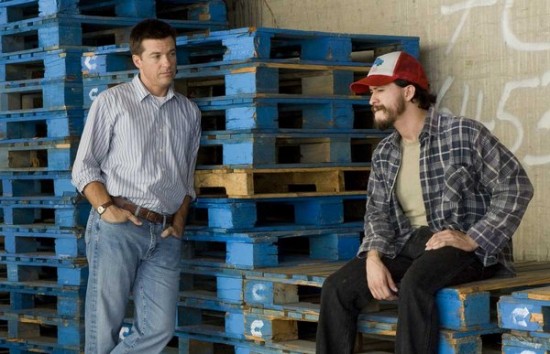 I'd like to ask you about the title for the film. It seems to be throwing people, some critics, because they feel it's not accessible. But I really like it, because "extract" is almost a MacGuffin in the movie. It seems like such a trivial thing, but this is how Jason's character makes his living. And this product is also behind how Joel [Jason Bateman] treats his employees, how he goes about being a good modern boss, and, you know, essentially being a good guy. The title seems dubious but afterward it made me think about all of this. It works as a word on a canvas or something, like art.Mike Judge: It's funny. The title is kind of an accident. I didn't have a title originally, and somebody, I don't know who, when the script went to Miramax, I hadn't shown it to many people: my producing partners, my manager, and then to Jason Bateman first. But somebody, when it got sent to Miramax, heard that it was called "Extract" for shorthand and put that on the title page. I had no idea. People started calling it that. And then it got online, so there was an awareness, and we really couldn't change it after that. It would have been confusing in the marketplace. But it was really just an accident. In fact, at one point I hated the title. Now I'm liking it, though, for the reasons you're saying. You kind of meditate on it. And there are all of these things that it could mean.And there are several shots in the film that linger on the "Extract" sign outside Joel's factory. And I really like the sign: how it was designed and what it stands for in the film. It's very quaint but meaningful. How did that come about?Mike Judge: Yeah. I love that. I had a really great production designer on this, Maher Ahmad (Zombieland). And where that came from, it used to be when you would drive from Austin to San Antonio, there was an Adams Extract factory on the side of the freeway. And it was just this great, classic-looking American factory building. I love how those factories look; there are a lot of them in Dallas. And when I was a musician on the road, I used to love seeing them, there was a great one in Kansas City. I love those old designs. So, I was thinking that Joel; what happens in Dallas a lot, something will go up that was built in the '50s, but now it's been occupied by three different companies making three different things. So, I figure Joel took it over and made that sign.
I'd like to ask you about the title for the film. It seems to be throwing people, some critics, because they feel it's not accessible. But I really like it, because "extract" is almost a MacGuffin in the movie. It seems like such a trivial thing, but this is how Jason's character makes his living. And this product is also behind how Joel [Jason Bateman] treats his employees, how he goes about being a good modern boss, and, you know, essentially being a good guy. The title seems dubious but afterward it made me think about all of this. It works as a word on a canvas or something, like art.Mike Judge: It's funny. The title is kind of an accident. I didn't have a title originally, and somebody, I don't know who, when the script went to Miramax, I hadn't shown it to many people: my producing partners, my manager, and then to Jason Bateman first. But somebody, when it got sent to Miramax, heard that it was called "Extract" for shorthand and put that on the title page. I had no idea. People started calling it that. And then it got online, so there was an awareness, and we really couldn't change it after that. It would have been confusing in the marketplace. But it was really just an accident. In fact, at one point I hated the title. Now I'm liking it, though, for the reasons you're saying. You kind of meditate on it. And there are all of these things that it could mean.And there are several shots in the film that linger on the "Extract" sign outside Joel's factory. And I really like the sign: how it was designed and what it stands for in the film. It's very quaint but meaningful. How did that come about?Mike Judge: Yeah. I love that. I had a really great production designer on this, Maher Ahmad (Zombieland). And where that came from, it used to be when you would drive from Austin to San Antonio, there was an Adams Extract factory on the side of the freeway. And it was just this great, classic-looking American factory building. I love how those factories look; there are a lot of them in Dallas. And when I was a musician on the road, I used to love seeing them, there was a great one in Kansas City. I love those old designs. So, I was thinking that Joel; what happens in Dallas a lot, something will go up that was built in the '50s, but now it's been occupied by three different companies making three different things. So, I figure Joel took it over and made that sign.
I also wanted to make his factory look like a place... Joel, he is ultimately proud of it and this is a place that he wants to come back to. So, I wanted to make it look nice. I was really happy with the way it came out, and the logo especially. Maher did a really great job. We looked at a lot of stuff, mixing classic. There are some products, like whiskey or beer, where you can't go too modern, and extract is one too. You want to make it look like it's been around, like Joel's dad would have used it. I wanted to get in the character's head.
What do you think makes Joel a successful boss?Mike Judge: Well, in drawing from my own experience, I think that it comes down to him liking what he makes. That's what drives him and everything else. And that's how I felt making Beavis and Butt-Head, especially starting out: I wasn't the best boss. But if you focus on including your employees in the goal, you get more respect. It helped me that I had started out in my house, inking and painting hundreds of cells and doing every process myself; so I wasn't some executive coming off the golf course going [sounds like a muted Principal McVicker], "You people go animate or you're fired!" I remember in my musician days, I remember this guy said never to demand respect, but earn it. There really is something to that, I think.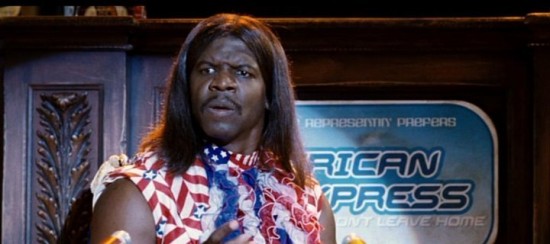 You seem to appreciate characters who don't seek out fame, they're not vain. Or on the flip, they're all about that, like President Camacho (from Idiocracy; above) [Judge says, "Oh yeah, true." laughs]. You're at work on a new project, Brigadier Gerard, based off the Sir Arthur Conan Doyle character. Vanity is a big theme with that too.Mike Judge: Yeah. That's a very funny character, that's a classic comedy character, that guy. He's like [Inspector] Clouseau. They're both very vain. What's interesting about those books is that [Gerard] is the one telling the story [as an old man], but you still realize that everyone around him can't stand him. With other characters, I've always thought, I remember thinking that on TV—and I've said this in other interviews—and in movies that people, especially in the '80s, seemed to have a lot of cash. And you either didn't know what they did or they have more cash than you think they would have [laughs]...Like Miami Vice, Crockett and Tubbs...Mike Judge: Yeah. [laughs] Like a police detective is living in a giant mansion and driving a Porsche. And then you watch The First 48 and they're fat schlubs driving crappy cars and they don't get paid a lot of money. [laughs] [laughs] I guess that stuff is just interesting to me and not given a lot of attention. And maybe that's why I gravitate towards that, but I also just like it. Part of it is a reaction to what's out there.What I find interesting is that you and David Chase, you work in different genres totally, but you have similar ideas about this. Chase, he's said that America doesn't like to talk about money, especially on television and in the movies, and that he's never understood that. It points to something bigger, maybe. I also feel like critics are hands-off with this topic. Would you say that's a fair statement and a theme in your work?Mike Judge: I'm a huge fan [of The Sopranos]. Sure, definitely. And that could be. I've always thought, I remember when I was a kid and my sister was reading these Nancy Drew books, and the character's hopping on a plane and going to all of these places. And I was like, "Wait, how did she pay for the ticket?" And then you become an adult, and you have car insurance, and you're like, "It's that much? Geez." I don't know why [more shows/movies don't address that]. And after I did Office Space and it didn't do well, I thought, "Well, maybe that's why no one wants to talk about those things." [laughs] But I really think people do want to, and I think there is an audience for it. That's interesting that [David Chase] said that about money. Wow. I really think that's true.
You seem to appreciate characters who don't seek out fame, they're not vain. Or on the flip, they're all about that, like President Camacho (from Idiocracy; above) [Judge says, "Oh yeah, true." laughs]. You're at work on a new project, Brigadier Gerard, based off the Sir Arthur Conan Doyle character. Vanity is a big theme with that too.Mike Judge: Yeah. That's a very funny character, that's a classic comedy character, that guy. He's like [Inspector] Clouseau. They're both very vain. What's interesting about those books is that [Gerard] is the one telling the story [as an old man], but you still realize that everyone around him can't stand him. With other characters, I've always thought, I remember thinking that on TV—and I've said this in other interviews—and in movies that people, especially in the '80s, seemed to have a lot of cash. And you either didn't know what they did or they have more cash than you think they would have [laughs]...Like Miami Vice, Crockett and Tubbs...Mike Judge: Yeah. [laughs] Like a police detective is living in a giant mansion and driving a Porsche. And then you watch The First 48 and they're fat schlubs driving crappy cars and they don't get paid a lot of money. [laughs] [laughs] I guess that stuff is just interesting to me and not given a lot of attention. And maybe that's why I gravitate towards that, but I also just like it. Part of it is a reaction to what's out there.What I find interesting is that you and David Chase, you work in different genres totally, but you have similar ideas about this. Chase, he's said that America doesn't like to talk about money, especially on television and in the movies, and that he's never understood that. It points to something bigger, maybe. I also feel like critics are hands-off with this topic. Would you say that's a fair statement and a theme in your work?Mike Judge: I'm a huge fan [of The Sopranos]. Sure, definitely. And that could be. I've always thought, I remember when I was a kid and my sister was reading these Nancy Drew books, and the character's hopping on a plane and going to all of these places. And I was like, "Wait, how did she pay for the ticket?" And then you become an adult, and you have car insurance, and you're like, "It's that much? Geez." I don't know why [more shows/movies don't address that]. And after I did Office Space and it didn't do well, I thought, "Well, maybe that's why no one wants to talk about those things." [laughs] But I really think people do want to, and I think there is an audience for it. That's interesting that [David Chase] said that about money. Wow. I really think that's true.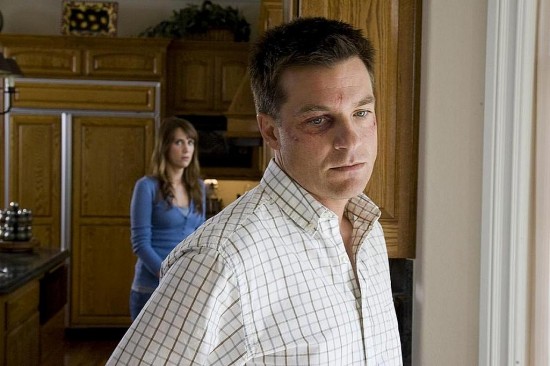 Right. Obviously on The Sopranos, money might be the root of all evil, and you both really infer how much things cost in the worlds you create. It's realistic. In Extract, you use a [central] ball joke to illustrate it. [laughs]Mike Judge: Yeah. And with that, I was worried that it was "just another testicle joke." But I wanted to really play it out: Like what would it be like if [an employee had a testicle blown off on a job site]. What if that really happened?Yeah. [laughs] It's like hot coffee on a lap. This happens in real life. But still, the absurdity of one guy's ball fucking up lots of lives is just...Mike Judge: Yeah. And I've always had this thing about how easily your nuts can get knocked off or damaged [laughs] [laughs]. You know, and I think the reason why I started worrying about this comes from when I made an X-ray machine for a science fair in high school, an X-ray generator. And I was using it without any protection, just out in the open and everything. And then I read about how it can make you sterile. [laughs] [laughs] And I just went and made this lead box for the whole thing. But for the longest time, I was like, "Geez, I wonder if I did some damage and I'm not going to be able to have kids." So, maybe that's where it all started.This segues into a separate question: Did you think about giving Joel and Suzie [Kristen Wiig] kids in Extract? It seems like that's usually the next step when a married couple is this unhappy: they have kids.Mike Judge: You know what? I agonized over that actually, and you're only the second person in the entire junket who's brought that up. The problem with that, once you do that...
Right. Obviously on The Sopranos, money might be the root of all evil, and you both really infer how much things cost in the worlds you create. It's realistic. In Extract, you use a [central] ball joke to illustrate it. [laughs]Mike Judge: Yeah. And with that, I was worried that it was "just another testicle joke." But I wanted to really play it out: Like what would it be like if [an employee had a testicle blown off on a job site]. What if that really happened?Yeah. [laughs] It's like hot coffee on a lap. This happens in real life. But still, the absurdity of one guy's ball fucking up lots of lives is just...Mike Judge: Yeah. And I've always had this thing about how easily your nuts can get knocked off or damaged [laughs] [laughs]. You know, and I think the reason why I started worrying about this comes from when I made an X-ray machine for a science fair in high school, an X-ray generator. And I was using it without any protection, just out in the open and everything. And then I read about how it can make you sterile. [laughs] [laughs] And I just went and made this lead box for the whole thing. But for the longest time, I was like, "Geez, I wonder if I did some damage and I'm not going to be able to have kids." So, maybe that's where it all started.This segues into a separate question: Did you think about giving Joel and Suzie [Kristen Wiig] kids in Extract? It seems like that's usually the next step when a married couple is this unhappy: they have kids.Mike Judge: You know what? I agonized over that actually, and you're only the second person in the entire junket who's brought that up. The problem with that, once you do that...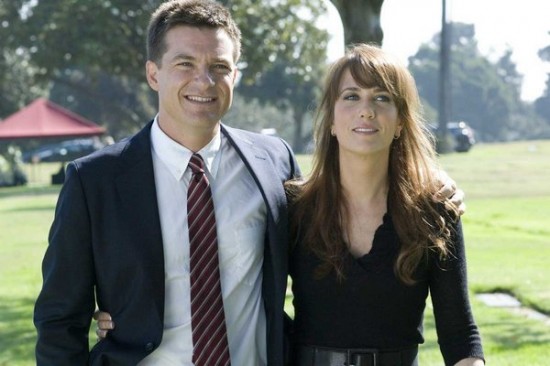 It might become cheesy, like Meet the Lil' Fockers...Mike Judge: Yeah, it becomes that, and it also becomes a little darker if a gigolo is coming over to their house [laughs] [laughs] and all that stuff. And once you have kids, you can't take that as lightly in the script. You have to deal with it. At least, that's what I found as I was writing. And at one point, I had them talk about why they don't have any, but ultimately I decided, "Okay, they're just people who keep putting it off." For whatever reason. I mean, I never wondered why Bob Newhart didn't have kids on The Bob Newhart Show, until I started hearing people talk about that. But yeah, I really went back and forth on that a bunch. It would have become too sad.Part Two of Hunter's interview with Mike Judge, in which they discuss Extract, Idiocracy, Gene Simmons as a lawyer, and the future of Beavis & Butt-Head will be posted shortly.Hunter Stephenson can be reached at h.attila[at]gmail.com and on twitter at www.twitter.com/hunterstep. A special thanks to "Clay Bill Clay," Zach, Tyler, Samuel, WL, Peter Sciretta, David Chen, and Beavis.
It might become cheesy, like Meet the Lil' Fockers...Mike Judge: Yeah, it becomes that, and it also becomes a little darker if a gigolo is coming over to their house [laughs] [laughs] and all that stuff. And once you have kids, you can't take that as lightly in the script. You have to deal with it. At least, that's what I found as I was writing. And at one point, I had them talk about why they don't have any, but ultimately I decided, "Okay, they're just people who keep putting it off." For whatever reason. I mean, I never wondered why Bob Newhart didn't have kids on The Bob Newhart Show, until I started hearing people talk about that. But yeah, I really went back and forth on that a bunch. It would have become too sad.Part Two of Hunter's interview with Mike Judge, in which they discuss Extract, Idiocracy, Gene Simmons as a lawyer, and the future of Beavis & Butt-Head will be posted shortly.Hunter Stephenson can be reached at h.attila[at]gmail.com and on twitter at www.twitter.com/hunterstep. A special thanks to "Clay Bill Clay," Zach, Tyler, Samuel, WL, Peter Sciretta, David Chen, and Beavis.
